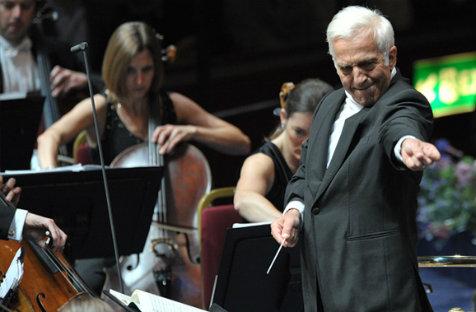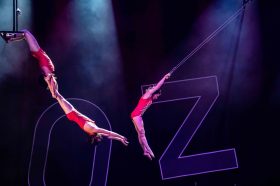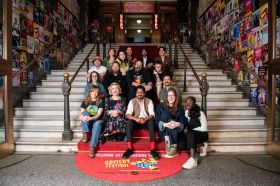How time does fly and sprint away from us. It was more than half a year now since Sydney Harbour was graced with the presence of Opera Australia’s production of La Traviata. If ever there was a case of an opera being fated to succeed from the offset, then La Traviata was that opera. The Sydney Opera House and Harbour Bridge as a backdrop. A massive, crystal-studded chandelier with many splendoured lights. A huge and potent fireworks display in the first act. The singing and music could’ve been terrible and the spectacle would have ensured that, while one may not have been transported into realms of aesthetic ecstasy, one didn’t feel that their time had been completely wasted. (The singing and music, as it turned out, were rather good.) Indeed, opera is often all about spectacle, even if spectacle is not what makes an opera truly great. So when this critic came upon the Sydney Symphony’s latest outing, namely a concert performance of Tchaikovsky’s The Queen of Spades, he was a tad concerned, for performing an opera without the spectacle is a bit like photographing a model without the makeup. Every flaw will be exposed.
Somewhat surprisingly (I don’t know why it should be surprising, but it was), The Queen of Spades turned out to be one of this critic’s most memorable operatic experiences of the year, rivalling only Opera Australia’s The Marriage of Figaro and Salome. Except for the fact that it lacked spectacle (though the expanded choir certainly helped), it was virtually flawless, and as dramatically intense as anything one is likely to hear. Vladimir Ashkenazy, principal conductor and artistic advisor, was the conductor for the evening, and managed to strike the precarious balance between high passion and mournful power, hitting just the right mood and tempo for all the musical emotions that needed to be depicted.
The plot? Hermann (Stuart Skelton) finds himself in love with Lisa (Dina Kuznetsova), daughter of the Countess (Irina Tchistjakova) and betrothed to Prince Yeletsky (Andrei Bondarenko). Upon hearing a tale, from Tomsky (Jose Carbo), about how the Countess came to be known as ‘the Queen of Spades’ through winning back her fortune through a secret combination of cards, Hermann becomes rather taken with the idea that he could, by finding out the secret, make his fortune and win Lisa’s hand in marriage. (Though to say ‘rather taken’ is to make it sound like a schoolboy whim – he is quite pathologically obsessed with the idea.) The story rolls on, the tragic end comes around, and all is left somewhat wrong with the world. The libretto, by Tchaikovsky’s brother Modest, is based on a story by Pushkin.
The only concession made to scenery in this quasi-production is that the lights come down during the third act. When Lisa gives the key to the Countess’ room to Hermann, the singers don’t exchange a real key. When the gambling finale deals out its fortunes, the singers have no cards. When the dancing interludes prance upon the stage, no dancers are to be found. And yet, with a little bit of imagination from the audience, it all works. (I tell a lie – there was a chair for the Countess to dramatically slump to her death into.)
It seems a tad redundant to say it, but the pulling-power displayed on the night, the yearning intensity of Tchaikovsky’s music, as well as some absolutely stunning performances by Skelton and Kuznetsova (with the rest of the cast not far behind), are what made this experience great. (Indeed, it’s what makes any opera experience great, but for it all to come together is quite a rare thing in Sydney, so one should shout it from the top of the Opera House’s sails when it happens.) That the performers were perfectly audible from the circle (where this critic was sat), especially in the Concert Hall, was something of a minor miracle as well. Mention should also be made of the Sydney Children’s Choir, who acquitted themselves well, and also the Sydney Philharmonia Choir, who gave that extra oomph to the proceedings that all good choirs do.
In summary, this was a particularly special occasion, and one to be remembered for quite some time. One can only hope the Sydney Symphony makes the foray into opera again sooner rather than later.
Rating: 5 stars out of 5
Tchaikovsky: The Queen of Spades
Sydney Symphony
Sydney Philharmonia Choir
Sydney Children’s Choir
Conductor: Vladimir Ashkenazy
Stuart Skelton (tenor), Jose Carbo (baritone), Andrei Bondarenko (baritone) Irina Tchistjakova (mezzo-soprano), Dina Kuznetsova (soprano), Deborah Humble (mezzo-soprano), Angus Wood (Chekalinksy), Gennadi Dubinsky (bass), Joshua Oxley (tenor), William Stavery (bass), Philip Pratt (tenor), Victoria Lambourn (mezzo-soprano), Amy Corkery (soprano), Tabatha McFadyen (soprano)
Concert Hall, Sydney Opera House
3 December





